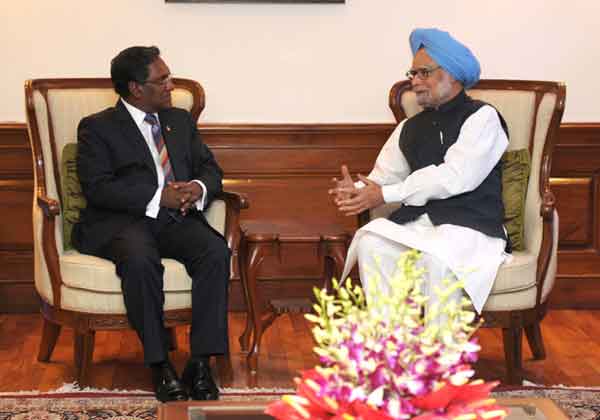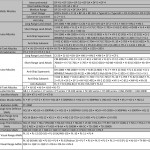
The President of Maldives, Dr. Mohamed Waheed meeting the Prime Minister, Dr. Manmohan Singh, in New Delhi
While writing the history of Indian diplomacy 25 years hence, any dispassionate historian will agree that the Manmohan Singh government’s neighbourhood policy has been a monumental failure. It has not contributed anything substantial to promote and consolidate India’s national interests in the country’s immediate neighbourhood. On the contrary, India’s image, credibility and influence have been allowed to be badly damaged in almost all the neighbouring countries.
Something was seriously wrong with the Indian intelligence and security agencies that they could not assess and predict the situation correctly.
China has toughened its posture on the vexed border issue and increasingly humiliated our citizens from Sikkim and Kashmir. The core problems with Pakistan remain as they were. In fact, it is under Manmohan Singh’s rule that Pakistani terrorists attacked Mumbai. Ties with Sri Lanka have been rapidly deteriorating, of late, thanks to the Prime Minister’s critical dependence on his Tamil Nadu allies. By forcing the democratic and pro-Indian forces in Nepal, with which India has had civilisational ties , to accept the Maoists as rulers, the Manmohan Singh government has committed such a blunder that now it has been reduced to be a big joke in the Himalayan country. Indian citizens and business men are no longer safe and secure there. Indian films are not being allowed to be screened there and a systematic campaign to expel Indian projects and business ventures is on. The way the Dabur group has been harassed in Nepal, with its products facing most hostile politically-motivated campaigns is just one example of the broader anti-India movement staged by the China-backed Maoists.
However, the most humiliating diplomatic episode under the Manmohan Singh regime has been the decision of the present government in the Maldives last week to scrap a contract to run its largest airport at Male without consulting the operator, the Bangalore-based GMR Infrastructure Ltd (which has built the New Delhi and Hyderabad airports). As Sanjaya Baru, Manmohan Singh’s previous information advisor says, “In Male, the GMR airport controversy is about more than domestic politics. Behind the veneer of a pretentious political outrage about the so-called non-transparency in the GMR deal lies a worrying rise of anti-India sentiment fuelled by a coming together of extremist Islamic groups, some close to extremist elements in Pakistan and Saudi Arabia, and a newly assertive pro-China business interests”.
It may be noted here is that the Airport contract was awarded to GMR and Malaysia Airports Holdings Bhd. (MAHB) in 2010 ( some aspects of the deal also related to British and Australian components) by then then-Prime Minister Mohamed Nasheed, who was ousted on February 7 in a coup backed fundamentalist forces. India just remained a silent spectator. Whichever angle one may look at it, Indian foreign policy failed terribly in the Maldives, given the manner the coup was staged. After all, three of Nasheed’s principal political detractors — the former president Gayoom’s Progressive Party of Maldives and the conservative Islamic formations, the Adhaalath Party and Dhivehi Quamee Party (DQP) had joined hands in what they called as the ‘Coalition of 23rd December’ to oust him. On the night of January 29, they had met the then Vice-President Waheed (and present President) and urged him to take over the functions of Presidency and called upon the Maldivian National Defence Force (MNDF) and the police to defy Nasheed and instead pledge allegiance to Waheed. And that was precisely what happened.
The “islamised” judiciary was creating problems for Nasheed by blocking many progressive policies and preventing the trials of the corrupt and criminal elements under President Gayoom.
Something was seriously wrong with the Indian intelligence and security agencies that they could not assess and predict the situation correctly. And this despite the fact that under the deposed President Naseed, Maldives and India had increased their defence and security cooperation. In 2009, President Naseed had allowed India to set up 26 radar stations across 26 Atolls of the Maldives. These stations are supposed to be linked to Indian Coastal Command. India was also allowed to establish an air force station for surveillance flights to monitor the ‘movement of pirates, terrorists, smugglers’.
The present regime in Male is supported by hardcore Islamic fundamentalists (helped by the Pakistani ISI and Saudi Arabia), whose supporters under President Gayoom had penetrated the vital organs of the State, including the judiciary. In fact, Naheed was criticised by his opponents for his moderate Islamic views. The “islamised” judiciary was creating problems for Nasheed by blocking many progressive policies and preventing the trials of the corrupt and criminal elements under President Gayoom. And most of these judges were appointed by Gayoom. It was against this background that Nasheed was working towards reforming the judiciary and was supposed to bring out necessary legislations by the end of February in the National Majlis where he had managed a majority sometime in January. In retrospect, it seems that the coup was staged just in time to thwart such an eventuality.
The coup was also backed by the rich and politically minded resort-owners in Maldives, most of them being supporters of the previous President Gayoom. They have been monopolizing the tourism sector, the country’s most important source of income. Nasheed encouraged competition in this sector and tried to bring the rich resort-owners under the tax nets to mop up revenue as the country had been hit by global recession. In fact, the proposed airport was planned with the specific purpose of boosting the tourism sector.
It may be noted here that tourism constitutes one-third of the island-chain nation’s economy. The traditionally rich and powerful resort-owners who control the tourism sector have a close nexus with fundamentalist political parties in general and that led by Gayoom in particular. . Naturally, they did not like Nasheed trying to end their monopoly and privileges, once the airport was open, more and more tourists came and more resorts were needed to be built. They therefore came forward to fund opposition to and to change the Nasheed regime. Some prominent resort-owners were in the forefront of the anti-Nasheed protests and rallies before and after the dramatic political change. Viewed thus, the cancellation of the Airport deal was a foregone conclusion under the present usurpers of power in Male.
It is said that Indian security officials were not comfortable with Nasheed’s proximity to the UK and the presence of British advisers around him.
There was also a Chinese angle behind the coup. After all, China had wonderful ties with Gayoom regime. Following the then Chinese Prime Minister Zhu Rongji’s visit to the Maldives in 2001, a proposal was made for establishing a Chinese submarine base in Marao Coral Island,, located about 40 km south of the capital Male. Though that did not happen, Gayoom signed a defence agreement with China that lasted till 2009. It was supposed to be renewed, but was not. As Nasheed has said in an interview: “the agreement was due for renewal in 2009, but I refused to go ahead with that. I had this paper on my desk even two weeks back. The MNDF sent me the letter saying I have to sign it. Now that I am out, China will certainly play an active role now. They will play much-much more active role in the Maldives”.
This being the case, it was surprising to see that the Indian strategic establishment under the Manmohan Singh government avoided coming to Nasheed’s rescue, something New Delhi had had done in 1988 when it foiled a coup – attempt , backed by the Sri Lankan Tamil extremist outfit PLOTE, against President Gayoom. It is said that Indian security officials were not comfortable with Nasheed’s s proximity to the UK and the presence of British advisers around him. It was believed that that the UK was pleading the USA’s case to Nasheed for granting a naval presence. Nasheed was also believed to be pro-Israel. Now, the US, UK and Israel (supposed to be pro- Nasheed) are on one side and China and Pakistan (pro Gayoom and Islamists) on the other. If the above reports are authentic, India seemed to have sided with China and Pakistan by not coming to the rescue of Nasheed!
Incidentally, replying to the so-called Indian misgivings about him, and contrasting himself with the Gayoom regime and his PPM which forced his ouster, Nasheed in an emotional outburst had said recently: “My question to Indian establishment is that if they think that we did not perform, do they think this (change of regime) is a better option?…Unlike PPM we are a group of people who strongly believe in India, their role and functions in Indian Ocean and the relationship that we want with India…The thing is India takes us for granted unlike the PPM. I think this is the biggest reason, a more logical reason (for India’s failure in understanding the situation in the Maldives). They know we will be with them. It is an ideological thing for us…Did we disturb Indian sensitivities? You can’t find a bigger Indian lover than me. Even if they say a thing against India, that is like saying it against me…We never articulated anything anti-Indian and my party has also not done that.”
Obviously, India’s clouts in Maldives have gone down considerably in Male following the coup, despite the fact that both the deposed and incumbent Presidents have visited Delhi in recent months. President Waheed has dared to say boldly in the Indian capital that there was no way he will be facilitating a speedy and fair general elections that he had promised to the Indian foreign secretary Ranjan Mathai who, during his two visits to Male, had a prepared a “road map” with all the political parties in that country. “India is not crazy”, said Waheed on May 13 in the Indian capital, affirming that it (India) would not do anything coercive with regard to “internal matters of Maldives”.
In fact, President Waheed has been bold enough to say later, “This is no longer the age of colonialism. Today no foreign country can influence the Maldives. Today we will maintain our sovereignty with bravery. We will not back down an inch. Today, the change (in power) in the Maldives is what Allah has willed. This did not happen because of one or two people coming out into the streets. No body had been waiting for this. Nobody even saw this day. The change came because Allah willed to protect Islam and decent Maldivian norms.”
Imagine what impact such assertion will have in neighboring Kerala, where Islamic fundamentalism, thanks to the Gulf money, is spreading rapidly. Manmohan Singh seems to have accepted a fait accompli.





This around, ther’s no foolish PLOTE-fighters, or rather coolis to be sent by RAW to make an invasion that would prompt Maldeebians to, unknowingly and foolishly, ask for help from the same devils that sent the invaders. So, there would not be any heroic landings like the ones in 1988.